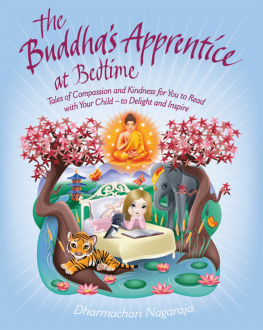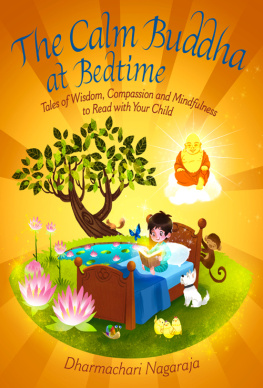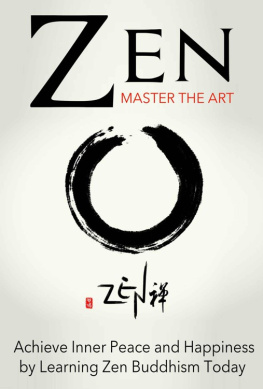
Acknowledgments
Inspiration comes in many forms and I want to thank the following for their contributions to my life:
Urgen Sangharakshita, Atula, Aloka, Alvin Marcetti, Audrey Spowart, Betty McMillan, Catherine Parkinson, Claire Kilmurry, Desmond Cheyne, Elaine Black, Caterina OConnor, Kuladharini, Lawrence McMillan, Maitreyabandhu, Michael Kilmurry, Moksabandhu, Sahaja, Stephen Potter, Suzanne Denis and Vimalacitta.
Note from the Author
If anything in this book is inaccurate, I ask forgiveness of my teachers as well as of my readers for having unwittingly impeded their way. As for what is accurate, I hope the reader can use it, so that they may attain the truth to which it points.
About This Book
W elcome to this new collection of Buddhist tales to share at bedtime with your children. It was wonderful to hear how many of you read and enjoyed my previous book, Buddha at Bedtime. This collection has also been inspired by the Jataka Tales traditional stories offering wisdom and guidance which are believed to have been told by the Buddha himself. As in Buddha at Bedtime, the tales have been updated to make them both compelling and accessible for todays young reader.
The stories explore a wide range of characters and settings to help your child engage with the age-old truths they impart. They are focused around explaining the eight great principles that underpin Buddhism, known as the Eightfold Noble Path. A more detailed guide to these principles is provided later in the introduction, but in essence they give us a code of conduct for our daily lives: acting with kindness and compassion, speaking thoughtfully, earning our livelihoods in an ethical way and using the power of the mind to manage our thoughts.
Each story is based on one of the eight principles and draws out its key ideas. You will find, for example, the story of a nervous young horse who learns to control her anxious thoughts; a young boy who defeats a band of robbers by the power of meditation; a miser who learns that making money does not in itself create a happy life; and a spoilt dukes son who learns to speak thoughtfully and feel compassion for others.
The books approach throughout is to encourage the understanding of an apprentice to the Buddha, a student whos learning the ways of the master.
The Jataka Tales are based on an ancient oral tradition where elders shared philosophical insights and powerful narratives at the conclusion of the days work when their audience was calm, relaxed and ready to reflect on how they might best live their lives. By reading these stories aloud to your child at bedtime, youll be drawing on the ancient power and wonder of the storytelling tradition. Taking the time to share the stories, to watch and respond to your childs reaction, and to encourage their imaginative exploration of characters and events, will help you both to unlock the rich wisdom underpinning each tale and highlight eternal truths for you to share.
You may also like to encourage your child to explore one of the key aspects of Buddhism, meditation. The stories can be a useful starting point in this process, helping to relax and calm your child. The introduction provides advice on incorporating meditation into your childs bedtime routine. Youll also find guided meditations inspired by the stories that you can do with your child at the back of the book.
Above all, enjoy the opportunity to share with your child the peace and understanding these simple yet profound Buddhist tales can awaken.
The Buddha and Buddhism
T he timeless message of the Buddha continues to speak to millions of people around the world. With its emphasis on the reality of change in our lives, the importance of compassion for others, and its focus on the management of the mind to avoid unproductive anxiety and illusion, Buddhism seems in tune with many of the insights of contemporary psychology and education. For many it offers guidance on ethical and moral behaviour, as well as practical assistance in coping with the stresses of day-to-day living skills that our children need now more than ever.
Buddhism is based on the teachings of the Buddha. The word Buddha means enlightened one and reflects the great wisdom the Buddha achieved in his lifetime. He began life as a privileged Nepalese prince called Siddharta Gautama, born around 566 BC . The oral traditions surrounding his life record that he grew increasingly troubled by the suffering he saw beyond the palace walls. He abandoned his position to search for an answer to the misery he saw in daily life. The Buddha wandered for years studying with wise men, living simply and learning to meditate, but he was dissatisfied with the answers to lifes problems he encountered. Finally the Buddhas enlightenment came as he meditated beneath a bodhi tree.
He developed an understanding of life that he came to call The Four Noble Truths:
1. Everyone experiences suffering in life no-one is exempt.
2. Suffering is caused by our focus on the material world it is caused by our greediness and constant desire for life to be more rewarding.
3. Suffering can be overcome.
4. The Eightfold Noble Path provides the guidance for overcoming suffering.
These truths formed the basis of the Buddhas new philosophy and he rapidly gained a group of followers who were inspired by his teachings. After the Buddhas death in around 486 BC these followers continued to develop the ideas hed initiated. Buddhism began to spread throughout India and then into Nepal, Bhutan, China, Mongolia, Japan and Tibet.
In Tibet, the spreading of the wisdom of the Buddha was symbolized by the conch shell. The shell could be blown like a trumpet, sending the Buddhas words throughout the world.
Today Buddhism is one of the fastest-growing spiritual movements in the West. The teachings of Buddhism may seem deceptively simple but in fact are both subtle and complex. The tales in this collection aim to help the young reader explore how the Buddhas insights can help them in their daily life, just as Buddhism has helped millions of people around the world for thousands of years.
The Eightfold Noble Path
T he essential principles of the Buddhist way of life are outlined in the Eightfold Noble Path. The Buddha himself described the Path as the means of overcoming suffering in life. The stories in this collection are based around these principles. Each one highlights ways to help your child understand each principles meaning and truth. The eight principles can be grouped together in three main subjects: wisdom, ethics and concentration.
Wisdom
The great wisdom of the Buddhas ideas is symbolized in Tibetan Buddhism by an endless knot his eternal wisdom, like the knot, has no beginning or end. Under the grouping of Wisdom we find two principles of the Path: Right View and Right Intention.
Right View centres on developing a deep understanding of the Four Noble Truths. There are two important aspects of Right View you can help your child to explore. Firstly, how everyone in the world experiences suffering, and secondly how suffering can be alleviated. The idea that everyone suffers may seem a harsh lesson, but its the basis from which compassion and empathy then flow. The story of Tim and Grandpa Joe illustrates how the kindness of Tim and his grandfather to the strangers they meet, as well as Tims own kindness to his grandfather, is rewarded.
Right Intention










